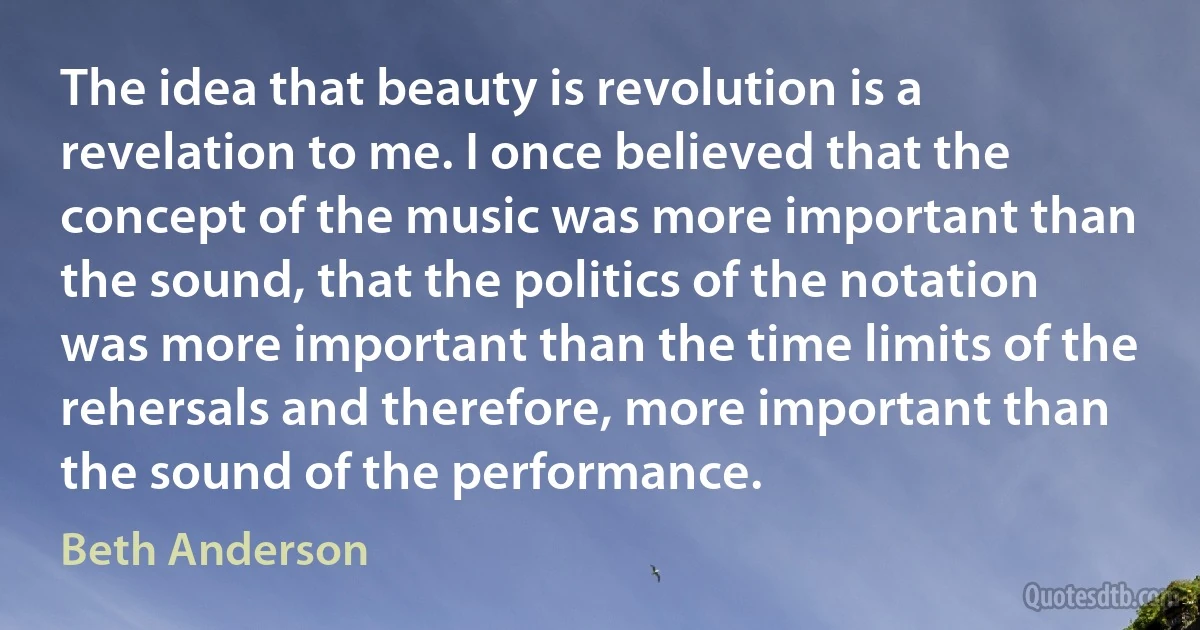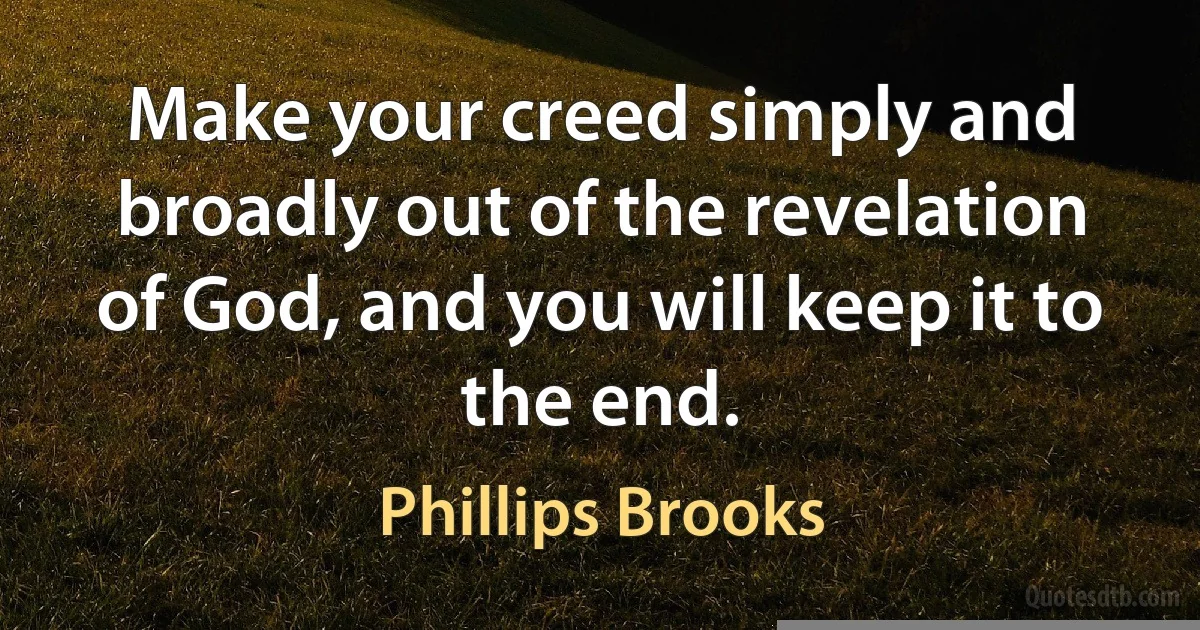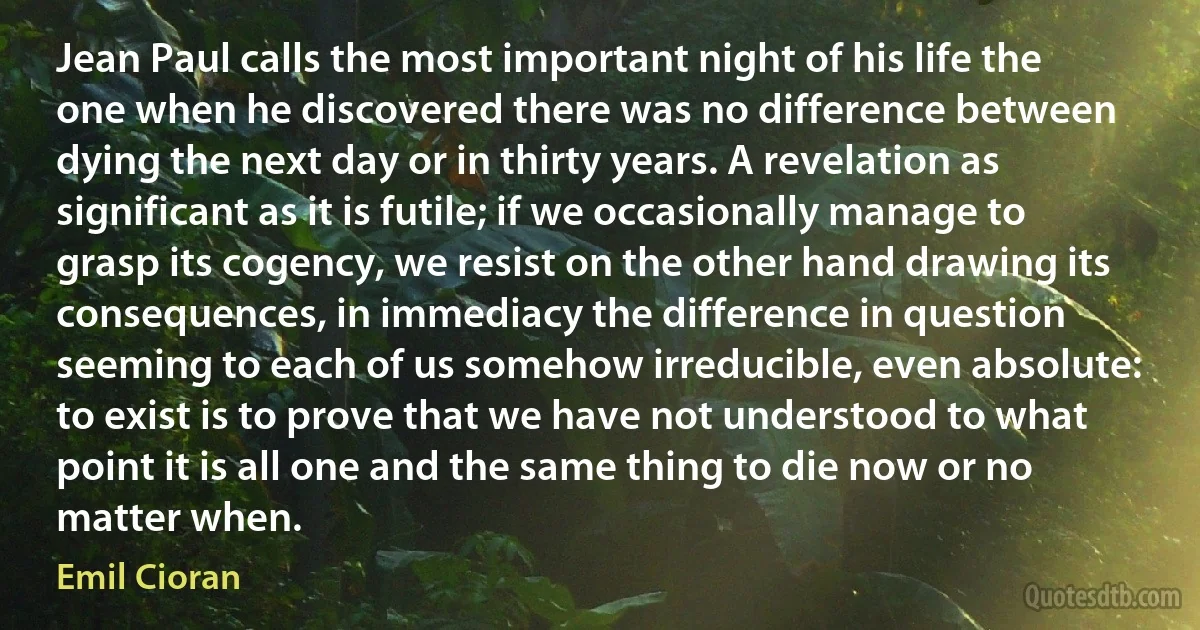Revelation Quotes - page 20
A wise man changes his mind sometimes, but a fool never. To change your mind is the best evidence you have one. The last redoubt holding out for me was the year-day principle (on which I had written a defense in 1972 for the Southern Publishing Association Daniel volume which was published in 1978). This collapsed when I handled hundreds of books of commentary on Revelation in the Library of Congress stacks and found that the respective authors had in many cases suggested dates that seemed appropriate for their own time but ridiculous later. It became clear that we, as Adventists, had done the same as our predecessors.

Desmond Ford
I have always known that I want to be a scholar. That it is a worthy thing for a man to work at the university and discover the secrets of nature. Scientific work was not a revelation, it was not a change in life direction – except my first dream to be a pearl diver. It was all from the nature, from home.

Jerzy Vetulani
The genuine safety-principle of true religion is contrariwise as follows. Whatever is a mean or condition of future bliss, unknown to naked reason, and promulgated singly by revelation, can strike root in my conviction, just like any other history; and so far forth as it does not militate against morality, cannot be absolutely false. Besides leaving this point totally undecided, I may unquestionably trust, that whatever of salutary there may lie in a document, will stand me in good stead, provided I do not by my moral short-coming make myself unworthy of it. In this maxim, there is a real moral safety, viz. That conscience be not violated; and more cannot be demanded from mankind. There is, moreover, an utmost danger and insecurity in that lauded stratagem of expediency, whereby we think astutely to evade any disadvantageous sequents that may spring from unbelieving nonconformity. Thus tampering with either party, we destroy our credit with both.

Immanuel Kant
Reason is natural revelation, whereby the eternal father of light, and fountain of all knowledge, communicates to mankind that portion of truth which he has laid within the reach of their natural faculties revelation is natural reason enlarged by a new set of discoveries communicated by God....

John Locke
In all things, therefore, where we have clear evidence from our ideas, and those principles of knowledge I have above mentioned, reason is the proper judge and revelation, though it may, in consenting with it, confirm its dictates, yet cannot in such cases invalidate its decrees nor can we be obliged, where we have the clear and evident sentience of reason, to quit it for the contrary opinion, under a pretence that it is matter of faith which can have no authority against the plain and clear dictates of reason.

John Locke
By further reflecting that the clearest evidence would be requisite to make any sane man believe in the miracles by which Christianity is supported,-that the more we know of the fixed laws of nature the more incredible do miracles become,-that the men at that time were ignorant and credulous to a degree almost incomprehensible by us,-that the Gospels cannot be proved to have been written simultaneously with the events,-that they differ in many important details, far too important as it seemed to me to be admitted as the usual inaccuracies of eye-witnesses;-by such reflections as these, which I give not as having the least novelty or value, but as they influenced me, I gradually came to disbelieve in Christianity as a divine revelation.

Charles Darwin
Donald Trump, the man who defied every political rule and prevailed to win his party's nomination, last week took on perhaps the most sacred political rule of all: Never attack a Gold Star family. Not just because it alienates a vital constituency but because it reveals a shocking absence of elementary decency and of natural empathy for the most profound of human sorrows - parental grief.
Why did Trump do it? It wasn't a mistake. It was a revelation. It's that he can't help himself. His governing rule in life is to strike back when attacked, disrespected or even slighted. To understand Trump, you have to grasp the General Theory: He judges every action, every pronouncement, every person by a single criterion - whether or not it/he is "nice” to Trump.

Charles Krauthammer
The Resurrection is the revelation: the disclosing of Jesus as the Christ, the appearing of God, and the apprehending of God in Jesus. The Resurrection is the emergence of the necessity of giving glory to God: the reckoning with what is unknown and unobservable in Jesus, the recognition of Him as Paradox, Victor and Primal History. In the Resurrection the new world of the Holy Spirit touches the old world of the flesh, but touches it as a tangent touches a circle, that is, without touching it. And, precisely because it does not touch it, it touches it as its frontier - as the new world.

Karl Barth
Is a Sufi a follower of Islam? The word Islam means 'peace'; this is the Arabic word. The Hebrew word is Salem (Jeru-salem). Peace and its attainment in all directions is the goal of the world.
But if the following of Islam is understood to mean the obligatory adherence to a certain rite; if being a Muslim means conforming to certain restrictions, how can the Sufi be placed in that category, seeing that the Sufi is beyond all limitations of this kind? So, far from not accepting the Quran, the Sufi recognizes scriptures which others disregard. But the Sufi does not follow any special book. The shining ones, such as 'Attar, Shams-i Tabriz, Rumi, Sadi, and Hafiz, have expressed their free thought with a complete liberty of language. To a Sufi, revelation is the inherent property of every soul. There is an unceasing flow of the divine stream, which has neither beginning nor end.

Inayat Khan
The fundamental solution to the problem of the credibility of religious axioms, and consequently the quintessence of the proofs of God, lies in the ontological correspondence between the macrocosm and the microcosm, that is, in the fact that the microcosm has to mirror the macrocosm; in other words, the subjective dimension, taken in its totality, coincides with the objective dimension, from which the religious and metaphysical truths derive in the first place. What matters is to actualize this coincidence, and this is what Revelation does, in principle or de facto, by awakening, if not always direct intellection, at least the indirect intellection which is faith; credo ut intelligam.

Frithjof Schuon
No art in itself is a human creation; however, what distinguishes sacred art is that its essential content is a revelation, that it manifests a properly sacramental form of heavenly reality, such as the icon of the Virgin and Child, painted by an angel, or by St Luke inspired by an angel, and the icon of the Holy Face, which dates back to the Holy Shroud and St Veronica; or such as the statue of Shiva dancing, or the painted or carved images of the Buddhas, Bodhisattvas and Taras.

Frithjof Schuon
Suffering is a spiritual thing. It is the most immediate revelation of consciousness, and it may be that our body was given us simply in order that suffering might be enabled to manifest itself. A man who had never known suffering, either in greater or less degree, would scarcely possess consciousness of himself. The child first cries at birth when the air, entering into his lungs and limiting him, seems to say to him: You have to breathe me in order to live!

Miguel de Unamuno
Physiologically, man in the normal use of technology (or his variously extended body) is perpetually modified by it and in turn finds ever new ways of modifying his technology. Man becomes, as it were, the sex organs of the machine world, as the bee of the plant world, enabling it to fecundate and to evolve ever new forms. The machine world reciprocates man's love by expediting his wishes and desires, namely, in providing him with wealth. One of the merits of motivation research has been the revelation of man's sex relation to the motorcar.

Marshall McLuhan
I repeat Sturgeon's Revelation, which was wrung out of me after twenty years of wearying defense of science fiction against attacks of people who used the worst examples of the field for ammunition, and whose conclusion was that ninety percent of it is crud.
The Revelation: Ninety percent of everything is crud.
Corollary 1: The existence of immense quantities of trash in science fiction is admitted and it is regrettable; but it is no more unnatural than the existence of trash anywhere.
Corollary 2: The best science fiction is as good as the best fiction in any field.

Theodore Sturgeon
Let it not be forgotten, however, that there is another side to the picture. The inflow of this energy has brought many hundreds of people into a new and deeper spiritual realisation; it has opened a door through which many will pass before long and take their second initiation, and it has let a flood of light into the world-a light which will go on increasing... bringing assurance of immortality and a fresh revelation of the divine potencies in the human being. Thus is the New Age dawning. Access to levels of inspiration, hitherto untouched, has been facilitated. The stimulation of the higher faculties (and this on a large scale) is now possible, and the coordination of the personality with the soul and the right use of energy can go forward with renewed understanding and enterprise. Ever the race is to the strong, and always the many are called and the few chosen. This is the occult law.

Alice Bailey



